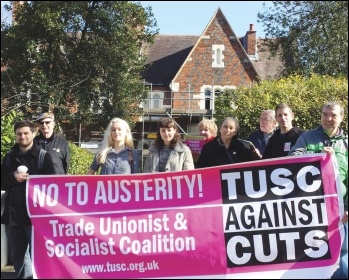Celebrating socialist pioneer Eleanor Marx’s 160th birthday
Marianne Murray, University of the Arts London Socialist Students
Eleanor Marx would have been 160 on 16 January this year. On that Saturday, socialists from London and further afield made a pilgrimage to Sydenham, her historic south London home, to commemorate the pioneering socialist, feminist and internationalist.
The event included insights from Rachel Holmes, author of the terrific ‘Eleanor Marx: A Life’. There was music from political theatre company Townsend Productions, fresh from a vibrant performance of socialist classic ‘The Ragged-Trousered Philanthropists’.
Hannah Sell, deputy general secretary of the Socialist Party, brought Eleanor’s politics into the present day. She compared the workers Eleanor helped unionise – such as the dockers and women factory workers – to the mass of often young, non-unionised workers in the private sector today. Many sit on zero-hour contracts, waiting for a shift – just as the dockers once lined up to be picked by the bosses.
As well as her political life, Rachel Holmes spoke of Eleanor’s contribution to culture. She made the first English translation of the seminal realist novel ‘Madame Bovary’, and was a great champion of realist playwright Henrik Ibsen.
Eleanor did not just fight for women in the workplace and in politics – as in her still important essay ‘The Woman Question: from a Socialist Perspective’. But she also challenged the expectations and limits placed on women’s behaviour in the 19th century.
Socialist feminism
She rejected the narrow feminism of women in the ruling class, which sought only to win rights for those at the top. She worked tirelessly for socialist feminism. To truly liberate all women; to enable working class women to unionise; to win women the right to education.
She saw the need for socialism, an end to the rule of the 1%, if divisions of gender are to ever be fully overcome.
Eleanor Marx never accepted the limits placed on her – as a woman, or as the poor daughter of a Jewish immigrant under constant surveillance. Her father, Karl Marx, was wanted by several capitalist governments.
Sadly, those around her did not always meet her high standards of personal and political radicalism. In something of a spoiler to her biography, Rachel outlined the very real possibility that Eleanor did not die by suicide. In fact, she may have been murdered by her long-time partner Edward Aveling at just 43 years of age.
Eleanor was an advocate of free love, and a counter-force to reactionary ideas of women being owned in marriage and shackled to family duties. Family friend Friedrich Engels was no doubt a big influence on this outlook. But she was nonetheless victimised by Aveling, despite her friends’ and comrades’ best efforts to protect her.
However, her tragic death in no way takes away from her astonishing legacy. She was a founder of the Socialist League and three trade unions; a master of polemic; but more importantly, a tireless activist, and a champion of the arts.
The event ended with an emotionally charged performance by Townsend, which brought the radical songs of Eleanor’s time to life. Actors included an excerpt of her famous speech:
“I am speaking this afternoon not only as a trade unionist, but as a socialist. Socialists believe that the eight hours’ day is the first and most immediate step to be taken, and we aim at a time when there will no longer be one class supporting two others, but the unemployed both at the top and at the bottom of society will be got rid of. This is not the end but only the beginning of the struggle.”
To this day, most of us still do not have an eight-hour working day. This, and so many other issues Eleanor fought for, are now up to us to fight for – and we can win.
- Rachel Holmes’ book ‘Eleanor Marx: A Life’ is available from Left Books; for £12.99 paperback , £25 hardback.
This version of this article was first posted on the Socialist Party website on 19 January 2016 and may vary slightly from the version subsequently printed in The Socialist.









